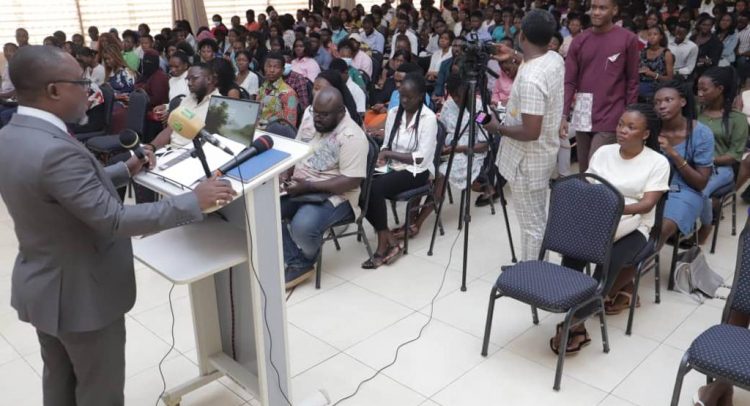Professor Ransford Gyampo is advocating for the inclusion of more youth in the governance structure of the country.
Whilst he appreciates the inclusion of a considerable number of young people into the current Akufo-Addo-led NPP government, he thinks there is still more that can be done to elevate the youth to assume and take leadership positions.
Speaking at a Youth Leadership and Inclusive Governance programme put together by The Rep Foundation in partnership with the Canada Fund for Local Initiative and the Ayawaso West Municipal Assembly in Accra Prof. Gyampo who is an Associate Professor at the Political Science Department of the University of Ghana (UG), Legon raised concern about the age limit one has to attain before they can enter Parliament and become President in Ghana which is 21 years and 40 years respectively.
For Prof. Gyampo, “what this means is that our 1992 Constitution sidelines young people from the core areas of governance, reducing them as vote-getters, foot-soldiers, and voting machines.”
That, he said was because “the political elites are quick to mobilize the youth for support during elections. They are used as agents to foment violent electoral conflict. But when government is being constituted, the youth are suddenly described as immature, inexperienced and an age of people who are dangerous to themselves and to the nation.”
Instead, he said “they are often told to bid their time and that the future belongs to them” and whilst insisting that “if the future belongs to the youth, then they must be prepared for the future, not through tokenism in appointment, but through deliberate effort to harness their zeal, potentials and enthusiasm for the governance processes at all levels, starting from the grassroots.”
That, he said was because “it is not all young people that are inexpenenced and danger to themselves.”
“There are young people who are smart, intelligent and matured. These are the cohorts who have ruled and continue to rule to develop countries that we describe as developed today” he emphasised.
Even though Africa has a young population, he had cause to express concern about the fact that its leadership is always gerontocracy (governed by old people).
“The average age human beings or populations in Africa is around 19 years, yet the average age of leaders in Africa is around 70years”, he noted whilst insisting that “these old leaders are often conservatives, sticking to the old ways of doing things. They do not have the energy and zeal to bring about drastic change and are always willing to protect their past legacies in a manner that always keeps the status quo.”
Meanwhile, he indicated that “in the traditional setting, chiefs were young and sat on the laps of the council of elders to rule successfully. The elders offered wise counsel to the youth and played their role in governance behind the scenes, giving the opportunity for the youth who have the energy and zeal, to fully participate in the governance process for development frontally.”
Where the youth erred, he said they were corrected by the elders.
But now, the UG don noted that “the elders who have no strength; the elders who have no zeal; the elders who have no energy; the elders who have no new ideas, still want to lead the governance process by playing frontal roles while nnarginalizing the youth in the governance process.”
He therefore noted that “the population of Ghana is youthful and this must reflect in the caliber of leadership that is selected to rule the country and the constitution of all appointive positions.”
On her part, Director of REP Foundation, Amma Serwaa Bonsu said over the years, Ghana has had enormous issues when the issue with inclusivity.
“The youth which forms a greater percentage of our country has always been underrepresented when it comes to governance”, she said.
She therefore noted that “this project is seeking the buy in and support of the district Assembly and youth groups to encourage youth participation in governance.by enhancing their skills” whilst thanking Canada Fund for Local Initiative and the Ayawaso West Municipal Assembly for the support.
By Charles Takyi-Boadu


